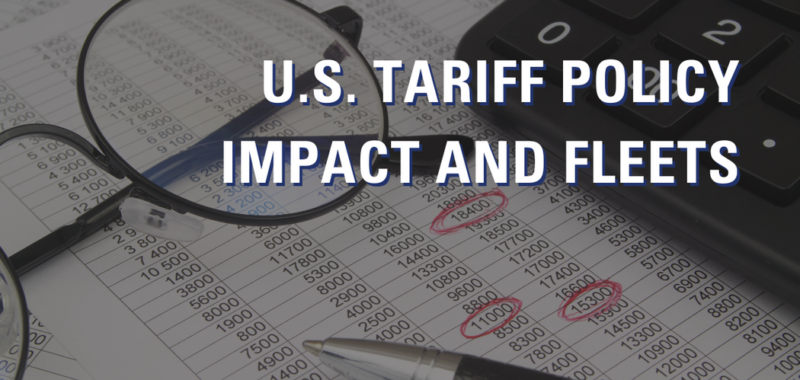
Whether it’s challenges in the delivery sector or rising costs for vehicles and parts, the full impact of tariffs on the commercial fleet industry remains uncertain.
Since the 2020 United States-Mexico-Canada Agreement (USMCA) brought trade changes, some U.S. business leaders have raised concerns about the potential effects of the latest proposed tariffs.
Tariffs imposed by President Donald Trump via executive order would add a 25% tax on imported goods from Mexico and 10% on imports from Canada and China. According to the White House, the tariffs “are in addition to any other duties, fees, exactions, or charges applicable to such imported articles.”
However, President Trump agreed to a 30-day pause on tariffs related to Mexico and Canada for border and crime enforcement concessions. The additional 10% tariff ordered on China still went into effect as scheduled on Tuesday, February 4.
Whether it’s challenges in the delivery sector or rising costs for vehicles and parts, the full impact on the commercial fleet industry remains uncertain.
Tariffs Could Threaten North American Auto Trade
In 2024, sales of new light vehicles in the U.S. totaled 16.1m units, 61% of which were manufactured locally. According to JATO Dynamics data, Mexico, Canada, and China accounted for 18% of total sales of new vehicles in the U.S. in 2024.
“While the situation is constantly evolving, the imposition of tariffs on the United States’ closest trade partners will have a major impact on the automotive industry in North America, affecting the millions of cars that enter the country from markets such as Canada, China, and Mexico every year,” Felipe Munoz, global analyst at JATO Dynamics, said.
Mexico is the second largest country of origin for new vehicles sold in the U.S. and a significant production and export hub for many carmakers. In 2024, Mexican-made light vehicle sales reached 2.19m units, accounting for 14% of the market and growing 13% yearly, outpacing U.S.-made vehicle growth of 1.7%.
Major automakers like Volkswagen, Stellantis, Nissan, Mazda, Honda, and Ford rely heavily on Mexican production and exports.

Major automakers like Volkswagen, Stellantis, Nissan, Mazda, Honda, and Ford rely heavily on Mexican production and exports.
Meanwhile, Canada’s role in U.S. auto imports has declined, ranking as the fifth-largest country of origin. In 2024, more vehicles sold in the U.S. came from the European Union than from Canada.
Toyota and Stellantis rely on Canadian-made vehicles for 18% and 14% of their U.S. sales, respectively, while only 5% of Ford’s U.S. sales came from Canadian plants.
Separately, 56,800 vehicles made in China were sold in the U.S. in 2024, giving the country a market share of 0.35%. “The US is imposing severe restrictions on Chinese-made vehicles despite the marginal role the country plays in America’s auto industry,” Munoz said.
Fleet Leaders Weigh In on Tariff Challenges
In a statement from the Board of Directors, the Automotive Fleet & Leasing Association (AFLA) warns that impending tariffs on Canada, Mexico, and China could majorly impact the fleet industry.
As the industry was recovering from pandemic-related challenges, new uncertainties around supply chain disruptions emerged.
Key concerns include:
- Delivery delays for vehicles and parts sourced internationally.
- Rising vehicle and operational costs due to import tariffs and demand-driven pricing.
- Budget constraints and extended vehicle lifespans (requiring fleet managers to adjust their strategies).
Given the interconnected nature of the U.S., Canadian, Mexican, and Chinese trade partnerships, AFLA is closely monitoring the situation and its potential effects on its members.
However, MEMA, The Vehicle Suppliers Association, supports the U.S. agreements with Mexico and Canada to delay proposed tariffs and continue trade discussions.
According to the company, this negotiation period offers a chance to find solutions that maintain North American trade stability and protect the vehicle supplier industry, which is a significant source of U.S. manufacturing jobs.
MEMA acknowledges President Trump’s priorities on border security and fentanyl trafficking but emphasizes the need for a collaborative approach that avoids disrupting the integrated North American supply chain.
“The unique partnership between the United States, Canada, and Mexico has enabled the creation, over many decades, of a robust automotive and commercial vehicle industry and strengthened US manufacturing competitiveness globally,” MEMA said in a company statement.
How Tariffs Are Impacting Small Fleet Operators and Costs
For smaller fleet operators that rely on global supply chains, the impending tariffs aren’t just a policy shift — they’re a direct threat to operational costs and pricing stability.
David Ziker, who just sold his stake in his 105-year-old family company, Indiana-based Ziker Cleaners, is following the updates.
“The obvious question is (price spikes) fuel for the delivery fleet,” Ziker said. “Our main suppliers, like poly and hangers, don’t come from Mexico, Canada, or China, but I have to assume everything will go up in price. The team back in South Bend is looking at this and gauging whether price increases for our customers will be the net result.”
“I’m about to order uniforms, and the prices in China have increased at least 15%,” said Jeb Lopez, CEO and owner of Wheelz Up, a last-mile delivery contractor.
From fuel for delivery fleets to the rising costs of essential supplies, business owners are bracing for higher expenses that could force difficult decisions on pricing and profitability.
Uncertainty Looms Amid Pause, Tariffs Could Increase
Although the 30-day pause offers temporary relief, fleet operators and suppliers remain on edge as unresolved trade negotiations or retaliations could lead to long-term disruptions.
The executive orders signed by Trump noted that if Mexico, Canada, or China retaliates against the U.S. concerning tariffs, the president may “increase or expand in scope the duties imposed under this order to ensure the efficacy of this action.”
Editor’s Note: This article was originally published at 8:00 a.m. EST on February 5 and was updated at 1:00 p.m. EST Feb. 5 to add comments and data from JATO Dynamics.

